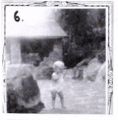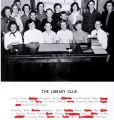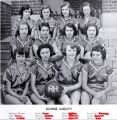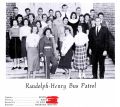Difference between revisions of "User:NightcoreSwift004"
m (→William Teer) |
|||
| Line 2: | Line 2: | ||
==Chris' ancestors sandbox test for a page == | ==Chris' ancestors sandbox test for a page == | ||
===William Teer=== | ===William Teer=== | ||
Bob's matrilineal great-grandfather, '''Dr. William M. Teer''' (March 29, 1837 - October 19, 1919), was born in {{w|Neshoba County, Mississippi}}, and grew up in {{w|Angelina County, Texas}} since he was 10 years old with his seven siblings. The family later relocated to {{w|Hopkins County, Texas|Hopkins County}} outside {{w|Cumby, Texas|Cumby}} in 1860, where he worked as a farmer before enlisting in the army for the Civil War. | |||
Bob's | |||
In October 1861, William and his | In October 1861, aged 24, William and his two brothers James (1830 - 1863) and Wiley (1839 - 1862), enlisted in the Confederate Army in San Antonio. Serving in the 4th Texas Cavalry Regiment, William participated in the {{w|New Mexico campaign}} under {{w|Henry Hopkins Sibley|General Sibley}}. Both of his brothers died during the war; James died at a Union prison camp in Williamsburg, Virginia, in 1863. William and Wiley fought in the battles of {{w|Battle of Valverde|Valverde}} and later to {{w|Battle of Glorietta Pass|Glorietta Pass}}, where in April 1862, Wiley was reportedly "lost or killed" and William suffered serious injuries, including a shattered right arm, a damaged spleen, and later contracting hepatitis (It might be worth reflecting how close Teer was to dying at this point - a slightly different outcome could have prevented all of Christory a century before it began). After the capture of Texas Army's supply wagons by the US Army, they retreated, leaving William and other recovering soldiers at the {{w|Santa Fe, New Mexico|Santa Fe}} hospital before shortly being captured. He was later paroled in May 1862, returning to San Antonio. Due to his injuries and disability, he was honorably discharged from his unit by General {{w|Thomas Green (general)|Thomas Green}} in September 1863 and returned to his home in Cumby, working as a farmer despite his shattered right arm. | ||
William was married | William was married four times throughout his life. In December 1862, he married Mary Frances Carraway of Alabama, who passed away in 1867. He then remarried Louisa Frances Spears of Tennesse, in 1868, but that marriage also ended early. In January 1871, he married Nancy Jane Coburn of {{w|Ashley County, Arkansas}}. From this marriage, he had seven children, including Mary Francis Teer, Bob's maternal grandmother and the wife of John James Hollomon. After Nancy's death in 1894, William remarried to Bettie King of {{w|Mount Pleasant, Texas|Mount Pleasant}} in March 1907 at age 70, and this marriage lasted until his death in 1919. | ||
In November 1903, | In November 1903, inspired by the nerve damage in his shattered right arm, William established himself as an {{w|osteopath}} doctor in {{w|Tyler, Texas}}, specializing in "Exophthalmic Goitre, Biliary Calculi (Gall Stones) Paralysis, and all Nervous Diseases." He became the president of the State Association of Drugless Doctors of Texas and advocated massaging and other holistic approaches to wellness. As a doctor in Tyler, he was described as a highly respected figure, endorsed by many prominent members of the city's society. After retiring, he resided at the Texas Confederate Home in Austin before moving back to Cumby in 1918, where he later passed away in October 1919 at his youngest daughter's {{w|Miller Grove, Texas|Miller Grove}} home caused by a second paralyzing stroke. | ||
William was mentioned in a book titled "[https://archive.org/details/texanswhoworegra00john| Texans who Wore the Gray (1907)]", written by a Confederate officer, journalist, and author Sidney Smith Johnson (1840-1910). Johnson described William as "a brave Confederate soldier, a man of fine education, and a Christian gentleman." | |||
==Sandbox page test== | ==Sandbox page test== | ||
Revision as of 16:04, 13 March 2024
Chris' ancestors sandbox test for a page
William Teer
Bob's matrilineal great-grandfather, Dr. William M. Teer (March 29, 1837 - October 19, 1919), was born in Neshoba County, Mississippi, and grew up in Angelina County, Texas since he was 10 years old with his seven siblings. The family later relocated to Hopkins County outside Cumby in 1860, where he worked as a farmer before enlisting in the army for the Civil War.
In October 1861, aged 24, William and his two brothers James (1830 - 1863) and Wiley (1839 - 1862), enlisted in the Confederate Army in San Antonio. Serving in the 4th Texas Cavalry Regiment, William participated in the New Mexico campaign under General Sibley. Both of his brothers died during the war; James died at a Union prison camp in Williamsburg, Virginia, in 1863. William and Wiley fought in the battles of Valverde and later to Glorietta Pass, where in April 1862, Wiley was reportedly "lost or killed" and William suffered serious injuries, including a shattered right arm, a damaged spleen, and later contracting hepatitis (It might be worth reflecting how close Teer was to dying at this point - a slightly different outcome could have prevented all of Christory a century before it began). After the capture of Texas Army's supply wagons by the US Army, they retreated, leaving William and other recovering soldiers at the Santa Fe hospital before shortly being captured. He was later paroled in May 1862, returning to San Antonio. Due to his injuries and disability, he was honorably discharged from his unit by General Thomas Green in September 1863 and returned to his home in Cumby, working as a farmer despite his shattered right arm.
William was married four times throughout his life. In December 1862, he married Mary Frances Carraway of Alabama, who passed away in 1867. He then remarried Louisa Frances Spears of Tennesse, in 1868, but that marriage also ended early. In January 1871, he married Nancy Jane Coburn of Ashley County, Arkansas. From this marriage, he had seven children, including Mary Francis Teer, Bob's maternal grandmother and the wife of John James Hollomon. After Nancy's death in 1894, William remarried to Bettie King of Mount Pleasant in March 1907 at age 70, and this marriage lasted until his death in 1919.
In November 1903, inspired by the nerve damage in his shattered right arm, William established himself as an osteopath doctor in Tyler, Texas, specializing in "Exophthalmic Goitre, Biliary Calculi (Gall Stones) Paralysis, and all Nervous Diseases." He became the president of the State Association of Drugless Doctors of Texas and advocated massaging and other holistic approaches to wellness. As a doctor in Tyler, he was described as a highly respected figure, endorsed by many prominent members of the city's society. After retiring, he resided at the Texas Confederate Home in Austin before moving back to Cumby in 1918, where he later passed away in October 1919 at his youngest daughter's Miller Grove home caused by a second paralyzing stroke.
William was mentioned in a book titled "Texans who Wore the Gray (1907)", written by a Confederate officer, journalist, and author Sidney Smith Johnson (1840-1910). Johnson described William as "a brave Confederate soldier, a man of fine education, and a Christian gentleman."
Sandbox page test
| barb high school photos |
|---|














